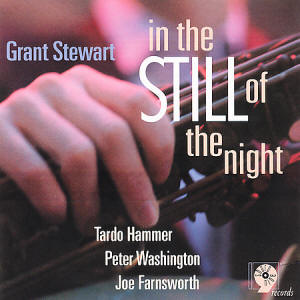|
You are reading the older HTML site Positive Feedback ISSUE march/april 2007
Grant Stewart's In the Still of
the Night
Sharp Nine Records ( CD 1038-2 ), Stewart, tenor sax; Tardo Hammer, piano; Peter Washington, bass; Joe Farnsworth, drums, Recorded, October 17, 2006 at Systems Two by Joe Marciano; Mastered by Mike Marciano Marc Edelman at Sharp Nine Records is one hell'uva judge of jazz talent and a genuine connoisseur of record production. He graced my world by dropping a few Sharp Nine titles on me for evaluation. They've been in nearly constant circulation among my several sound systems from the moment I plunked Grant Stewart's "In the Still of the Night" into the transport. While Marc-the-sharp is a guru of jazz vibes, the youthful Grant is a saxophone torrent not to be missed. First, there's the sound …the sound of Joe Marciano's recording and mixing work; of Grant Stewart's deeply Rollins-inflected horn, enough to kill an unwary jazzophile. Second, there's the tight ensemble focus of this "take no prisoners" quartet, starring pianist extraordinaire Tardo Hammer. Why didn't my folks name me Tardo Hammer, one of the suave-est names ever …hip-ness its namesake carries with full force and dignity. Amusements notwithstanding, this album is about the brilliant maturity of four special musicians. They play their cans off top to bottom. There's not a dog in this litter of songs. Today my favorite (punched in over and over) is Burt Bacharach's "Wives and Lovers." Yesterday it was Monk's "Work." A couple of days back it was Fred Lacy's "Theme for Ernie"—a song, played twice by John Coltrane on the sound track of "Barfly," nearly stealing the film from Faye Dunaway and Mickey Rourke. One notes how thoroughly Grant Stewart tutored himself on Sonny Rollins' sound and chops. An unusual degree of concentration and dedication stand inside this young man's lyrical voice. Back in the late '50s I was floored the first time I heard Rollins' sound. The entire history of jazz lined up behind (and within) Rollins' horn at that moment. His technique and musical approach were newly mentored by that Great Eccentric Jazz Classicist, Thelonious Monk. In truth, Sonny Rollins received his Jazz PhD at the elbow (in the living room) of one of bop's inventors. From 1954 through 1960 or so, Sonny Rollins was "the man" even as 'Trane was carving innovative sound sheets, glissandi and obbligatos in order to make a furious run at the top rung. In many ways—and this is part of the startling power of Grant Stewart's achievement—Sonny Rollins was, and still is, the more essential transitional figure between Coleman Hawkins, Lester Young, Don Byas, Lucky Thompson, Dexter Gordon, and Ben Webster, on one hand, and the post-bop/hard bop generation that included Hank Mobley, Joe Henderson, Johnny Griffin and Wayne Shorter along with Rollins and 'Trane, on the other hand. My point here is that Grant Stewart has distilled Rollins' sound and attack within the immensely lyrical thought and feeling that reside at the heart of his predecessor's buoyant cheerfulness. The darkest strain in Rollins' playing is a tendency toward irony and sardonic humor. Innately, Rollins is full of bonhomie and warm fellowship. He has always pursued a narrative lyric comedy that flirtatiously stitches together a complex structural interplay of melodies, quotes and musical puns into audacious, improbably coherent solos. Although I find here, among these recorded indications of Grant Stewart's enormous talent, nothing that approaches the scope of The Guru's manic zeal, what does appear is a relentless lyric resolve that forms the bedrock foundation of Sonny Rollins' playing. It's precisely that strength—a no nonsense appreciation for melody and for unabashed blowing with coherent structures—that underscores both my admiration for this savvy young saxophonist and for his example of iconoclastic musical courage, disavowing contemporary stylistic orthodoxy. Grant Stewart found his sound, his mentor and his musical trajectory. He made them his own and, in doing so, reveals how ageless and perennially current their inspirational musical embodiment truly is. I have more to say about Sharp Nine Records and, especially, about that dynamo of unerring Thelonious Monk-Barry Harris happiness, pianist Tardo Hammer. I'll soon explore these in a separate review. For the moment, let me welcome to the Untried Waiting Beyond a young musician I should have known long before this late moment. Perhaps, however, it's never too late—as two of Tardo Hammer's recent album selections suggest. Serious jazz listeners operate between two moments, arriving "Very Early" somewhere not fully clarified and the "Minor Mishap" of never arriving at all. Like Gil Fuller and Dizzy Gillespie (or like Emerson, drunk, waving to Walt Whitman), I'll salute Grant Stewart here by saying sincerely, "I Waited for You."
|

